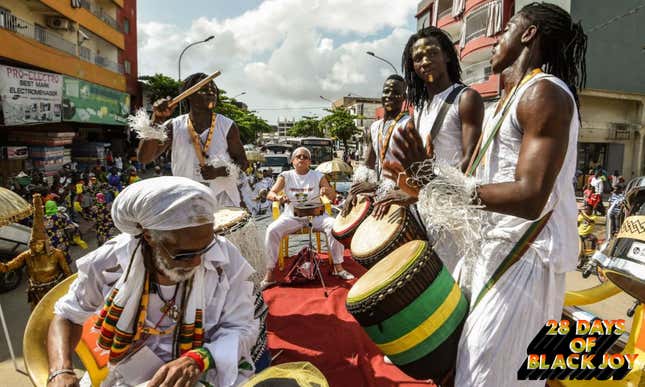
I’m a Black woman who was born and raised in Jamaica, an island in the Caribbean you might have heard of (whether for its music or its food or its incredibly fast track stars). Being Jamaican can almost seem synonymous with being Black, since over 90 percent of the population is of African descent (I brought a friend of mine on a visit home once and she said so much of Jamaica reminded her of Nigeria).
I grew up steeped in a culture closely tied to the traditions brought to Jamaica’s isles by the people who were taken from West Africa in chains centuries ago and forced to work on sugarcane plantations for the enrichment of the United Kingdom.
As a child, my extracurricular activities included going to Kumina dance classes, where I learned to move my hips, like my ancestors did, to the rhythm of the beat of drums made with goat skin; in school, I learned about Nanny of the Maroons, the storied warrior and Jamaican national heroine who enslavers brought to a place indigenous Arawaks called Xamayca (“land of wood and water”), where she ended up leading a guerilla army of Black people that defended and won their freedom from the British in blood. As a teenager, I began to truly listen to the lyrics of the reggae songs I’d been hearing ever since I could remember—Bob Marley singing about Zimbabwe, Buju Banton singing about Sudan, Jamaicans singing about how Blackness was a gift and evidence of kinship, no matter where in the world it exists.
But if I’m being honest, moving to America is what really made me recognize the gift and greatness of Blackness, like when I started working in majority-white places and found companionship, community and understanding from African-American women, some who mothered me with affirmations and love languages that felt keenly familiar though they came in a different accent.
Or when I realized the depth of discrimination the generations of Black people who have built this country have experienced and marveled even more at the expansive beauty they’ve been able to create despite it all.
Or when I sat next to a grandfatherly Black man at a bus stop in Chicago and we launched into a comfortable conversation about race in America, like we were just picking it back up where we’d left off.
Or when I went to get fitted for new glasses and the Black guy behind the counter, wearing an Ankh pendant around his neck, greeted me like a long-lost sister when he learned I was Jamaican and showed me the book of Marcus Garvey’s speeches he was reading.
Or even when I was sitting at a bar in Hawaii one winter and got a nod from another Black traveler who told me how happy it made him to see another Black person that day.
And that time I went to the Dominican Republic—which looks strikingly like Jamaica—and had to remind my dance partner of our shared roots when he asked with surprise where I learned how to move my hips and Bachata.
Or when I learned that in the 1950s, before Jamaican musicians blossomed into creating their own influential music genres like ska and reggae, they were singing bass-heavy versions of the R&B songs being made by their African American brethren.
Or when I opened up Twitter and saw a group of insanely talented kids performing freestyle dancehall music and looking like they’re standing on a corner in Spanish Town, Jamaica—except they’re actually in Ghana.
I’m reminded of how much our Blackness has kept us tied beautifully together, in the memories that have survived in our bodies and in our spirits, no matter how far we’ve been pulled apart. And those ties that still bind bring me such deep, reassuring, hopeful joy.

